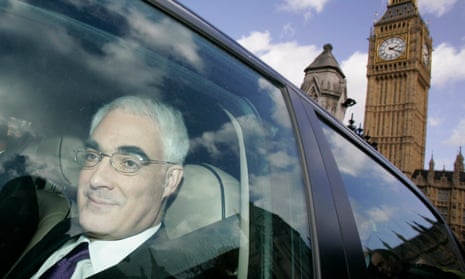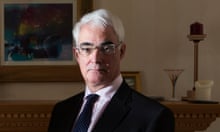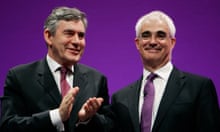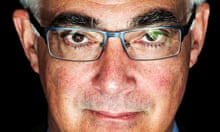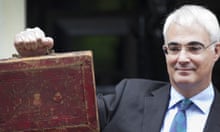Alistair Darling spent three turmoil-filled years as Gordon Brown’s chancellor but the crunch came in October 2008 when he was summoned out of a meeting of EU finance ministers to take a call from Royal Bank of Scotland, then the UK’s biggest bank.
The news was grim. RBS was running out of cash and would soon have to close branches and shut down cash machines. “How long have you got?” Darling asked, expecting the answer to be a couple of days. He was told the bank had two or three hours before it ran out of money.
Even the normally unflappable Darling felt a twinge of panic at that point. If RBS were to go belly-up the consequences not just for the other vulnerable UK banks but for the entire economy were easy to imagine.
A much underrated chancellor, Darling, who has died aged 70, rose to the occasion. He contained his sense of impending dread, flew back to London and helped piece together a rescue plan that involved part public ownership of RBS.
The rescue packages put together by the Treasury and the Bank of England were the high point of his spell as chancellor, which began in the summer of 2007 and ended with Labour’s defeat at the 2010 general election.
He had to tackle three big problems. The first was that he took over at the Treasury from a man who had been doing the job for more than a decade. Gordon Brown would have been a tough act to follow in normal circumstances, and these were far from normal circumstances. Darling often chafed at what he saw as Brown’s attempt to continue running economic policy even after he had moved from 11 Downing Street to the house next door.
A much bigger problem was that a financial crisis began almost as soon as Darling arrived at the Treasury. The seemingly inconsequential closure of two hedge funds at BNP Paribas in August 2007 set in train a sequence of events that brought the global banking system to the brink of collapse.
By the time Lehman Brothers was declared bankrupt in September 2008, trust had evaporated. In the early years of the decade, banks had loaded up on complex financial instruments linked to the US housing market. These trades were highly leveraged, which meant lucrative returns so long as property prices did not crash. When they tumbled, losses were magnified. Since nobody knew for sure the exposure of each individual bank to these toxic derivatives, banks stopped lending to each other, triggering a monster credit crunch.
after newsletter promotion
Darling – who in an August 2008 Guardian interview correctly predicted the impact would lead to the worst economic crisis in the six decades since the second world war – never wanted to own UK high street banks. But he came to the conclusion that the only way to restore confidence was to spend tens of billions of pounds of taxpayers money on recapitalising them. By mid-October 2008 the threat of collapse had passed.
Despite the bailout, the economy was still in a desperately weak state. So Darling’s third problem was the need to get the UK moving while at the same time announcing measures that would kick in later to reduce what at the time was record peacetime borrowing. Darling made a decent fist of it. A combination of VAT cuts, more generous benefits, and fast-forwarded public investment meant the economy was growing again by the end of 2009, with a multiyear deficit reduction plan delayed until after the election. But it was not enough. Labour lost in 2010 and a gentle recovery was halted by George Osborne’s full-on austerity.
